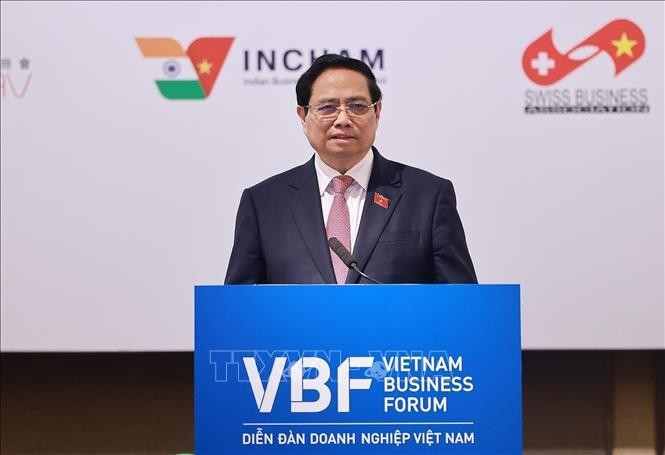PM Pham Minh Chinh said GDP growth is projected to exceed 8% this year, with average growth of 6.3% for the 2021-2025 period. Vietnam leapt 37 places to 46th in the World Happiness Report 2025. Socio-political stability has been firm, with about 1.1 quadrillion VND (42.3 billion USD) allocated for social welfare. National defense-security has been reinforced, while external relations and global integration have expanded. Vietnam has established comprehensive and strategic partnerships with 38 countries, including all five permanent members of the U.N. Security Council and 17 G20 economies, and has signed 17 free trade agreements with major global partners.
    |
 |
|
PM Pham Minh Chinh speaks at the event. |
On business climate reforms, he highlighted aggressive streamlining of administrative apparatus, adoption of a two-tier local administration model, and faster decentralization and delegation of authority. The shift is from command-style administration to service-oriented governance, he said.
Key Politburo resolutions on science and technology, innovation, digital transformation; global integration in the new context; institutional reform; and private sector development are advancing rapidly, he noted.
According to him, administrative cuts eliminated or simplified nearly 4,300 business regulations, procedures and citizen documents. Vietnam climbed to 44th out of 139 economies in the 2025 Global Innovation Index and to 71st among 193 nations in the 2024 e-government index, up 15 places from 2020. FDI inflows for 2021-2025 are estimated at 185 billion USD, up nearly 9% from the prior five years and enough to rank among the top 15 emerging-market recipients.
He credited domestic and foreign firms for the results, expressing thanks to them and development partners.
Challenges persist, however. Technology transfer and local content remain low in some projects, domestic-FDI linkages are weak and high-tech, green projects are still limited. Some localities fall short on skilled labor for large-scale, high-tech ventures, he said.
Green and digital transformation is “inevitable” and aligns with global trends, the PM stressed. Digital progress must pair with green, circular, knowledge-based and shared-economy models, requiring international collaboration on capital, technology, management and market access, he added.
Vietnam will maintain political stability and social order, push three strategic breakthroughs in institutional reform, hard and soft infrastructure, and quality human resources, while restructuring the economy and reforming the growth model, sustaining macroeconomic stability, and bolstering connectivity between domestic and FDI enterprises, he said.
At the same time, Vietnam will continue boosting public-private partnerships and broad involvement of all sectors, hasten administrative reform, improve business environment, and develop green and digital economic infrastructure, particularly logistics, smart cities, data centers, 5G networks and cloud computing, he added.
The cabinet leader urged firms to take the lead in green transition, deepen partnerships, and pursue sustainable development aligned with environmental, social, and governance (ESG) standards. They must raise awareness of environmental responsibility and engage in policy discussions.
The Government, he said, will push ministries and localities to drastically tackle obstacles and fulfill development 2025 targets, paving the way for the 2021-2025 five-year plan and the 2021-2030 socio-economic development strategy.
Regarding stalled projects, authorities are resolving issues in the spirit of balancing interests and sharing risks, he told business leaders.
The VBF was co-hosted by the Ministry of Finance, the World Bank, the International Finance Corporation and the Vietnam Business Forum Consortium.
Source: VNA